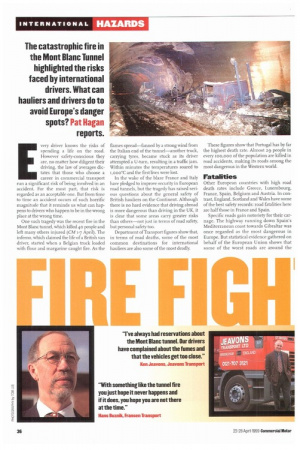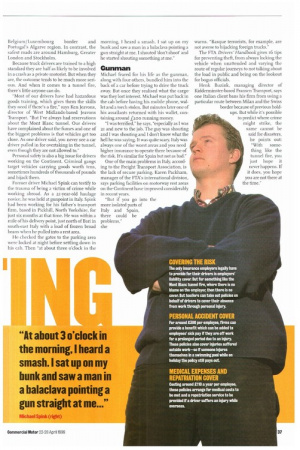The catastrophic fire in the Mont Blanc Tunnel highlighted the
Page 38

Page 39

If you've noticed an error in this article please click here to report it so we can fix it.
risks faced by international drivers. What can hauliers and drivers do to avoid Europe's danger spots? Pat Hagan reports.
very driver knows the risks of spending a life on the road. However safety-conscious they are, no matter how diligent their driving, the law of averages dictates that those who choose a career in commercial transport run a significant risk of being involved in an accident. For the most part, that risk is regarded as an acceptable one. But from time to time an accident occurs of such horrific magnitude that it reminds us what cars happens to drivers who happen to be in the wrong place at the wrong time.
One such tragedy was the recent fire in the Mont Blanc tunnel, which killed 40 people and left many others injured (CM 1-7 April). The inferno, which claimed the life of a British van driver, started when a Belgian truck loaded with flour and margarine caught fire. As the
flames spread—fanned by a strong wind from the Italian end of the tunnel—another truck, carrying tyres, became stuck as its driver attempted a U-turn, resulting in a traffic jam. Within minutes the temperatures soared to i,000'C and the first lives were lost.
In the wake of the blaze France and Italy have pledged to improve security in European road tunnels, but the tragedy has raised serious questions about the general safety of British hauliers on the Continent. Although there is no hard evidence that driving abroad is more dangerous than driving in the UK, it is clear that some areas carry greater risks than others—not just in terms of road safety, but personal safety too.
Department of Transport figures show that, in terms of road deaths, some of the most common destinations for international hauliers are also some of the most deadly.
These figures show that Portugal has by far the highest death rate. Almost 29 people in every I00,000 of the population are killed in road accidents, making its roads among the most dangerous in the Western world.
Fatalities
Other European countries with high road death rates include Greece, Luxembourg, France, Spain, Belgium and Austria. In contrast, England, Scotland and Wales have some of the best safety records: road fatalities here are half those in France and Spain.
Specific roads gain notoriety for their carnage. The highway running down Spain's Mediterranean coast towards Gibraltar was once regarded as the most dangerous in Europe. But statistical evidence gathered on behalf of the European Union shows that some of the worst roads are around the Bel gi um/ Luxembourg border and Portugal's Algarve region. In contrast, the safest roads are around Hamburg, Greater London and Stockholm.
Because truck drivers are trained to a high standard they are half as likely to be involved in a crash as a private motorist. But when they are, the outcome tends to be much more serious. And when it comes to a tunnel fire, there's little anyone can do.
"Most of our drivers have had hazardous goods training, which gives them the skills they need if there's a fire," says Ken Jeavons, director of West Midlands-based leavons Transport. "But I've always had reservations about the Mont Blanc tunnel. Our drivers have complained about the fumes and one of the biggest problems is that vehicles get too close. As one driver said, you never see a car driver pulled in for overtaking in the tunnel, even though they are not allowed to."
Personal safety is also a big issue for drivers working on the Continent. Criminal gangs target vehicles carrying goods worth tens, sometimes hundreds of thousands of pounds and hijack them.
Former driver Michael Spink can testify to the trauma of being a victim of crime while working abroad. As a 21-year-old haulage novice, he was held at gunpoint in Italy. Spink had been working for his father's transport firm, based in Pickhill, North Yorkshire, for just six months at that time. He was within a mile of his delivery point, just north of Bari in south-east Italy with a load of frozen broad beans when he pulled into a rest area.
He checked the gates to the parking area were locked at night before settling down in his cab. Then "at about three o'dock in the morning, I heard a smash. I sat up on my bunk and saw a man in a balaclava pointing a gun straight at me. I shouted 'don't shoot' and he started shouting something at me."
Gunman Michael feared for his life as the gunman, along with four others, bundled him into the back of a car before trying to drive the truck away. But once they realised what the cargo was they lost interest. Michael was put back in the cab before having his mobile phone, wallet and a torch stolen. But minutes later one of his assailants returned with his wallet, containing around /zoo running money.
"I was terrified," he says, "especially as I was zi and new to the job. The guy was shouting and I was shouting and I don't know what the hell he was saying. It was quite scary. Italy was always one of the worst areas and you need higher insurance to operate there because of the risk. It's similar for Spain but not as bad," One of the main problems in Italy, according to the Freight Transport Association, is the lack of secure parking. Karen Packham, manager of the PTA's international division, says parking facilities on motorway rest areas on the Continent have improved considerably in recent years.
"But if you go into the more isolated parts of Italy and Spain, there could be problems," she warns. "Basque terrorists, for example, are not averse to hijacking foreign trucks."
The FTA Drivers' Handbook gives 16 tips for preventing theft, from always locking the vehicle when unattended and varying the route of regular journeys to not talking about the load in public and being on the lookout for bogus officials.
Henk Buzink, managing dii-ector of Kidderminster-based Fransen Transport, says one Italian client bans his firm from using a particular route between Milan and the Swiss border because of previous holdups. But while it's possible to predict where crime might strike, the same cannot be said for disasters,
he points out: "With some• thing like the tunnel fire, you just hope it never happens. If it does, you hope you are not there at the time."








































































































